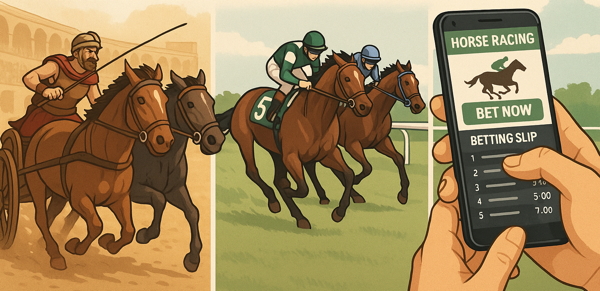 |
RacingBetter News |
| Monday 11th June 2025 | |
Horse Racing Betting: History
Horse racing betting is not just a form of gambling, it is an entire industry with a rich and fascinating history that is closely intertwined with the development of equestrianism. Horse racing betting has come a long way, from ancient chariot races to modern online bookmakers, and has become one of the oldest and most popular types of betting in the entire world.

Ancient Roots and First Mentions
The idea of competitions, and then betting on horse racing, goes back to ancient times. Back in Ancient Greece and the Roman Empire, horse racing, especially chariot races, was incredibly popular. Spectators, of course, did not miss the opportunity to bet on who would win the race. Back then, there weren’t any official bookmakers and best bet, but locals loved making casual bets and arguing over the results. The winners of the races and their patrons were greatly respected while betting added to the excitement of the spectacle.
The Era of Prosperity and Legalization
The real prosperity of horse racing betting began in the 17th century in Great Britain. The Royal Family supported horse riding, which helped start official racetracks and set rules for racing. It was then that the famous English horse races, such as the Epsom Derby, came about, which are still the standard of horseback riding.
As the popularity of horse racing increased, the need for a more organized system of accepting bets emerged. This was when the first professional bookmakers appeared. At first, they acted as private individuals, accepting bets from the public directly at the racecourses. However, the lack of regulation often led to fraud and unfair competition.
In the 19th century, horse racing betting became extremely popular among all segments of the population. Special publications dedicated to horse racing appeared, publishing information about horses, jockeys, and odds. At the same time, bookmakers started setting up outside the racetracks, making their services available to more people. The legalization and regulation of gambling in some countries, especially in the UK, contributed to the establishment of horse racing betting as a full-fledged industry.
The Impact of Technological Breakthrough
The beginning of the 20th century was marked by the further spread of horse racing betting worldwide. This sport became popular in the USA, Australia, Japan, and other countries. With the development of telecommunications, sports fans could now place bets remotely.
A major turning point was the introduction of the totalizer. This system, which originated in France in the late 19th century, radically changed the betting process. In a totalizer, all bets on a certain result are put together in one big pool and after the gambling company takes its share, the rest is paid out to the winners. This provided greater transparency and fairness, as odds were based on the total amount of bets.
The mid-20th century brought with it further automation. With the introduction of telephones and telegraphs, bookmakers could start taking bets from a distance. Later on, the first computers helped gambling establishments work out the odds and keep track of bets. The appearance of land-based bookmakers outside the racecourses became widespread, allowing punters to easily access events and odds, as well as receive their wins.
The Digital Revolution
The 21st century was a revolution for the horse racing betting industry thanks to the Internet and mobile technology. The launch of online bookmakers has contributed to:
- Accessibility: Betting is now accessible from anywhere in the world, at any time, with simple access to the Internet.
- Globalization: Punters have the opportunity to bet on races that take place in different countries, from Epsom Downs to the Melbourne Cup.
- Convenience: Online gambling platforms offer a wide range of features, including live streaming of races, statistics, analytics, and different bet types.
- Innovation: The development of artificial intelligence and data analysis technologies allows bookmakers to provide more accurate odds. Thanks to AI, players can make more informed decisions.
Nowadays, horse racing betting is part of a multi-billion dollar betting industry, combining centuries of tradition with the latest technology. This sport draws the attention of both die-hard horse racing fans and individuals who are just looking for some excitement and the opportunity to test their luck.







